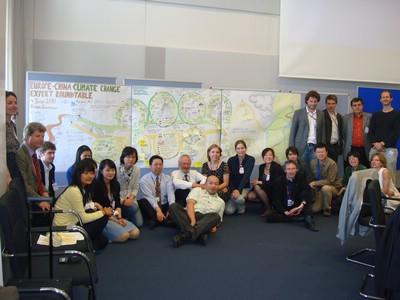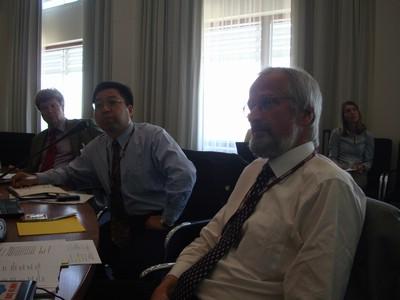Eruope-China Climate Change Expert Roundtable
On the occasion of the recent UNFCCC climate change talks in Bonn, held from 30 May to 11 June 2010, more than 30 representatives from Chinese and European non-governmental organizations, scientific experts and other stakeholders involved in the UN climate talks discussed for one day their perspectives on climate change impacts, vulnerability and concrete cooperative action at the UN University Campus in Bonn. The roundtable meeting was initiated by the China Civil Climate Action Network (CCAN), Germanwatch and the United Nations University.
Specific topics that were discussed during the roundtable included adaptation and vulnerability to climate change, and the resulting real world challenges for China and which of them could be addressed by China-EU Partnerships. The participants also discussed the current state of the UNFCCC process to identify areas for strategic engagement and progress in 2010. The meeting also gave opportunity for small working groups discussions to identify specific leverage points for possible concrete cooperation of civil society for local-level action, China-Europe joint partnerships and how to support progress on UNFCCC level.
Participants very much appreciated the approach of this informal set up, which allowed for mutual listening and better understanding where the largest potentials for enhanced cooperation in the areas of climate and energy exists. Klaus Milke, CEO of Germanwatch, commented that after Copenhagen the need for simultaneously negotiating and implementing concrete action has become central for global climate protection. Europe and China together could give a strong signal through enhanced cooperation on climate protection. According to Dr. Koko Warner of the United Nations University Institute for Environment and Human Security (UNU EHS) it was very encouraging to see how much research and activities linking poverty reduction, adaptation and low-carbon development is already happening at the national and local levels, in places such as China. There is still much to learn from each other, and dialogue can help move ideas to action. Huang Haoming, Executive Director of CANGO, stated that intensive exchanges and cooperation between Europe and China on political, economic and civil society levels to achieve zero or low-carbon economies comprise great economic opportunities, can eliminate social tensions and contribute to global climate protection.
Other participants represented a wide range of organisations from both Europe and China including Friends of Nature, Institute for Environmental and Development, WWF Beijing and Hong Kong, Heinrich Boell Foundation, Climate Action Network Europe, Centre for International Migration and Development (CIM), Cambridge University, the UNFCCC Secretariat, Werkstatt Oekonomie, Asienhaus, Third World Network, Evangelischer Entwicklungsdienst (EED) and the Global Wind Energy Council.
The meeting laid the foundations for regular European-Chinese exchanges on climate change to be continued in the future. New opportunities for exchange will arise during the next session on UNFCCC negotiations to be held in October 2010 inChina.
Contact
for further information or interview requests:
Klaus Milke, Chairman of the Board, Germanwatch, milke@germanwatch,org, +49 (0) 172 4072837
Dr. Koko Warner, UnitedNationsUniversity, warner@ehs.unu.edu, +49 (0) 228 815 0226
Wang Xiangyi and Patrick Schroeder, CANGO, wangxiangyi@cango.org, patrick@cango.org


Related News
Photos
More>>trade
- CCAN Will Pay Close Attention to United Nations Climate Change Talks in Tianjin
- The Third Forum on Innovation and Development of China Social Organizations
- 4th International Conference on Corporate Social Responsibility
- The First CCAN Side Event Was Held Successfully in Tianjin
- The Seventh Law and NGO Salon
market
finance
- BNBM Defends Global Best Gypsum Enterprise Title
- Process Test Ceremony of HCRDI 5,000t/d in Russian Cement Plant
- Zhongfu Lianzhong 5MW Composite Blade & 1.5MW Bamboo Fiber Blade Offline
- Sudan s largest cement project undertaken by HCRDI completed
- HCRDI signs Vietnam 12,000t/d cement line installation contract





